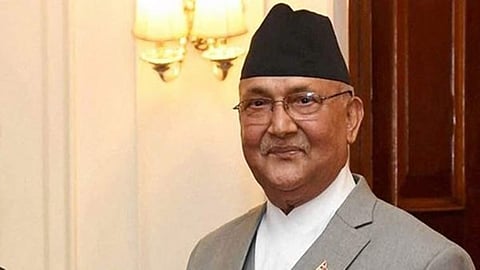Nepal's PM Oli: Border issues with India to be resolved through dialogue and diplomacy
Nepal's newly-appointed Prime Minister K P Sharma Oli on Monday said that there is an understanding with India to resolve the border issues through diplomatic mechanisms and that Kathmandu was "clear and firm" about its international border.
Responding to questions from lawmakers in the House of Representatives, a day after he comfortably won a vote of confidence, Oli said that the government is firm and clear that the territories lying on the East of Mahakali River, including Limpiyadhura, Kalapani and Lipulek, belong to Nepal as per the Sugauli Treaty of 1816.
“The federal parliament and Nepal government are clear and firm about the country’s international border,” Oli said.
“Nepal has adopted a new map that has been incorporated through the Second Amendment to the Constitution in 2017 and mentioned in its Annex 3 and there has been unprecedented national consensus regarding our international border,” Oli said.
Oli, 72, was sworn in as Nepal's Prime Minister on July 15.
“An understanding has been reached between the two countries to sort out border issues through diplomatic mechanisms when the prime ministers of Nepal and India met during high-level visits,” he said.
“The issues related to the Nepal-India border were also discussed during the 7th Nepal-India foreign ministerial-level joint commission’s meeting held on January 4, and commitment was made to complete the pending works on the remaining sections of the Nepal-India border as soon as possible,” he said.
Ties between the two countries came under severe strain in 2020 after Kathmandu published a new political map that showed the three Indian territories - Limpiyadhura, Kalapani and Lipulekh - as part of Nepal.
India had rejected Nepal's new political map that showed the three Indian territories as part of the Himalayan nation.
“This artificial enlargement of claims is not based on historical fact or evidence and is not tenable. It is also violative of our current understanding to hold talks on outstanding boundary issues," India's External Affairs Ministry said at that time.
Land-locked Nepal relies heavily on India for the transportation of goods and services. Nepal is also important for India in the context of its overall strategic interests in the region, and the leaders of the two countries have often noted the age-old “Roti Beti” relationship.
Nepal shares a border of over 1,850 km with five Indian states – Sikkim, West Bengal, Bihar, Uttar Pradesh and Uttarakhand.
Prime Minister Oli also informed the lawmakers that the construction and restoration of border posts along the Nepal-India border was underway.
“Construction, restoration, and repair of border pillars, along with technical work such as preparation of no-man’s land and cross-holding, are being carried out continuously. Efforts are being made to resume meetings in bilateral harmony,” Oli said.
“The Government of Nepal is committed to resolving the border issues through pursuing dialogue and diplomacy with the Government of India based on the Sugauli Treaty, various maps, historical facts and evidence,” PM Oli said.
During the question-answer session in the House, PM Oli also informed that an Armed Police Force (APF) unit has been deployed in Chhangru of Darchula district and at the same time six border outposts — five along the borders with India and one along the borders with China — have been added in Darchula district in recent times.
.png)


